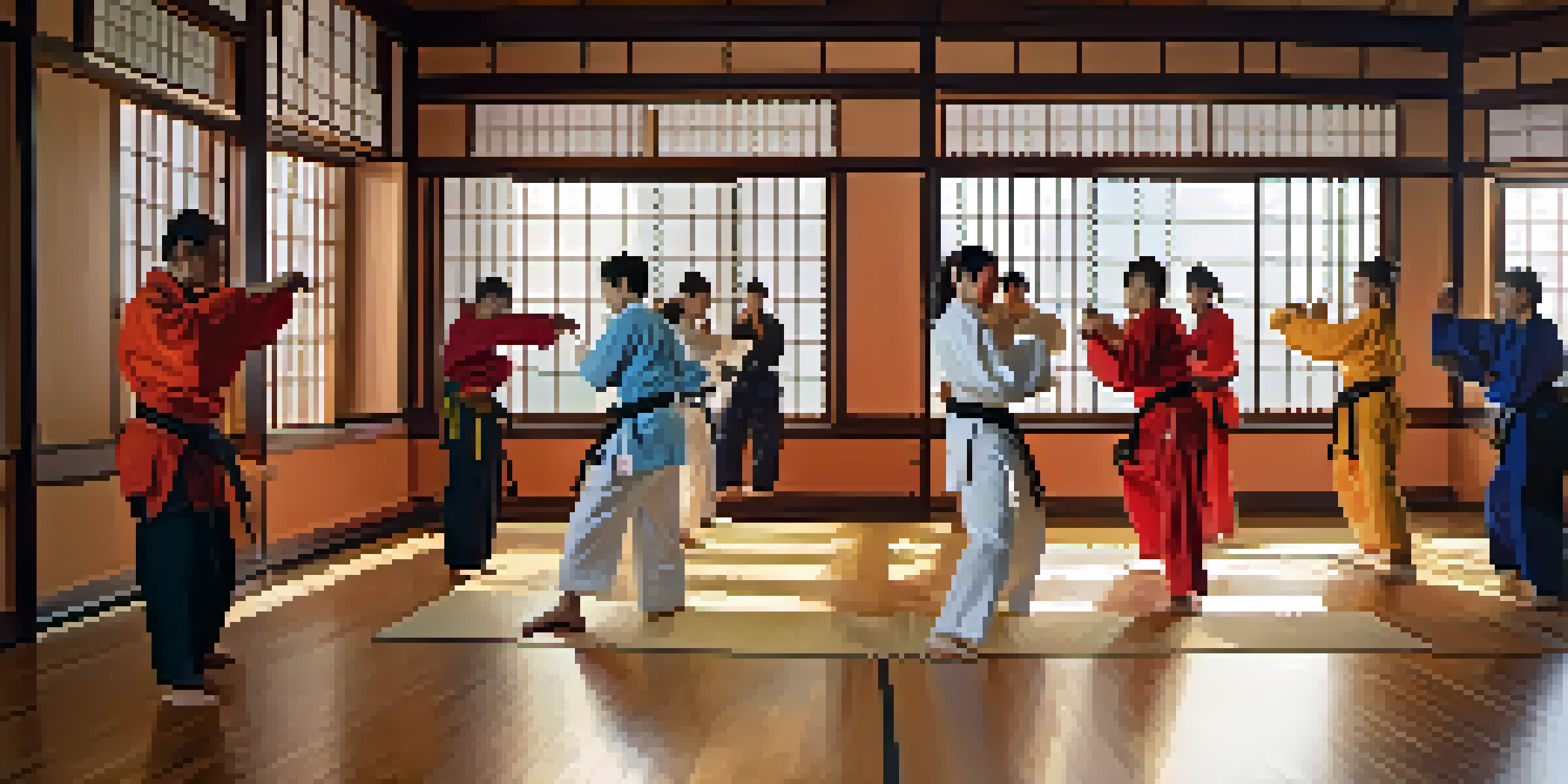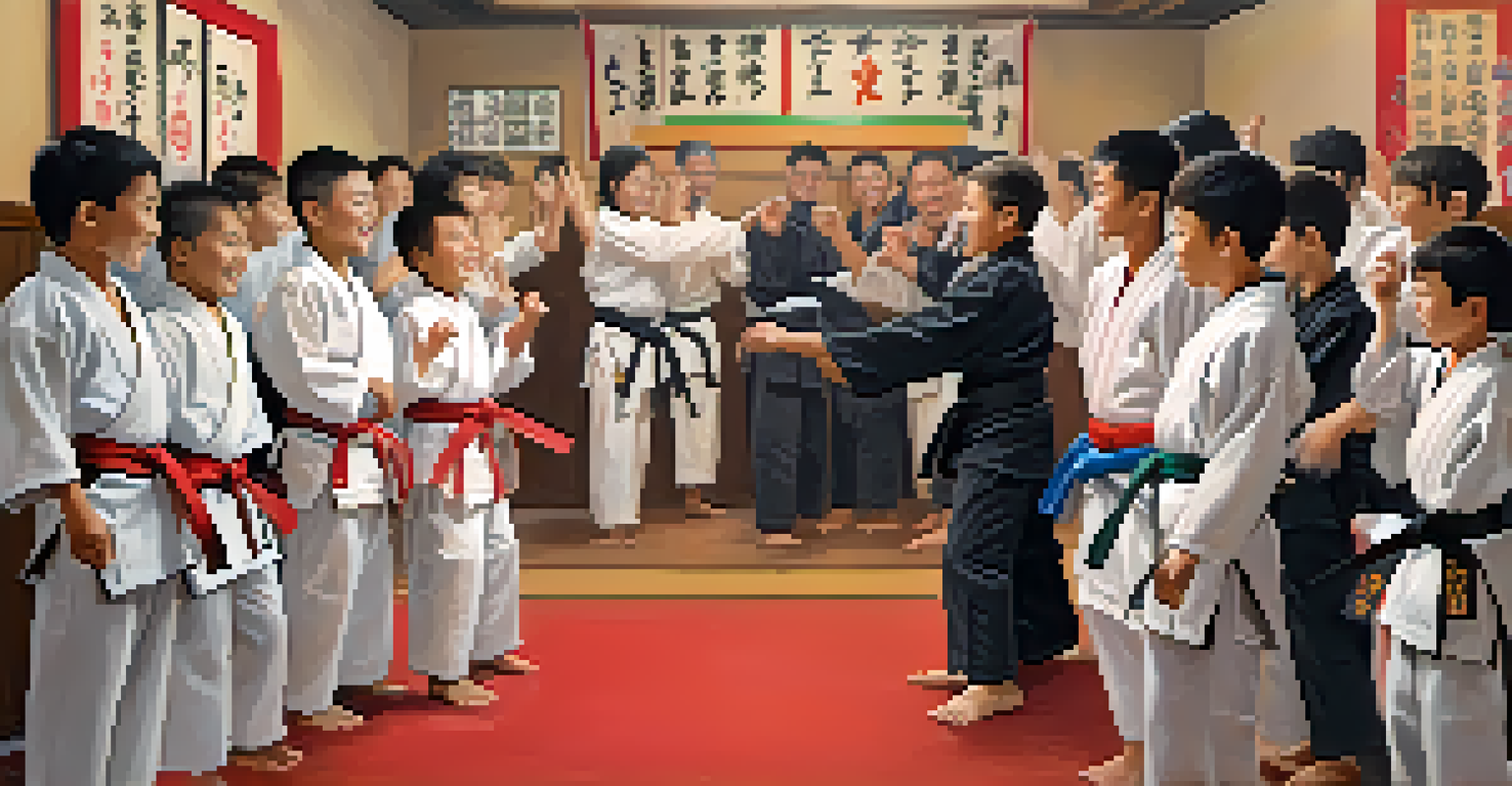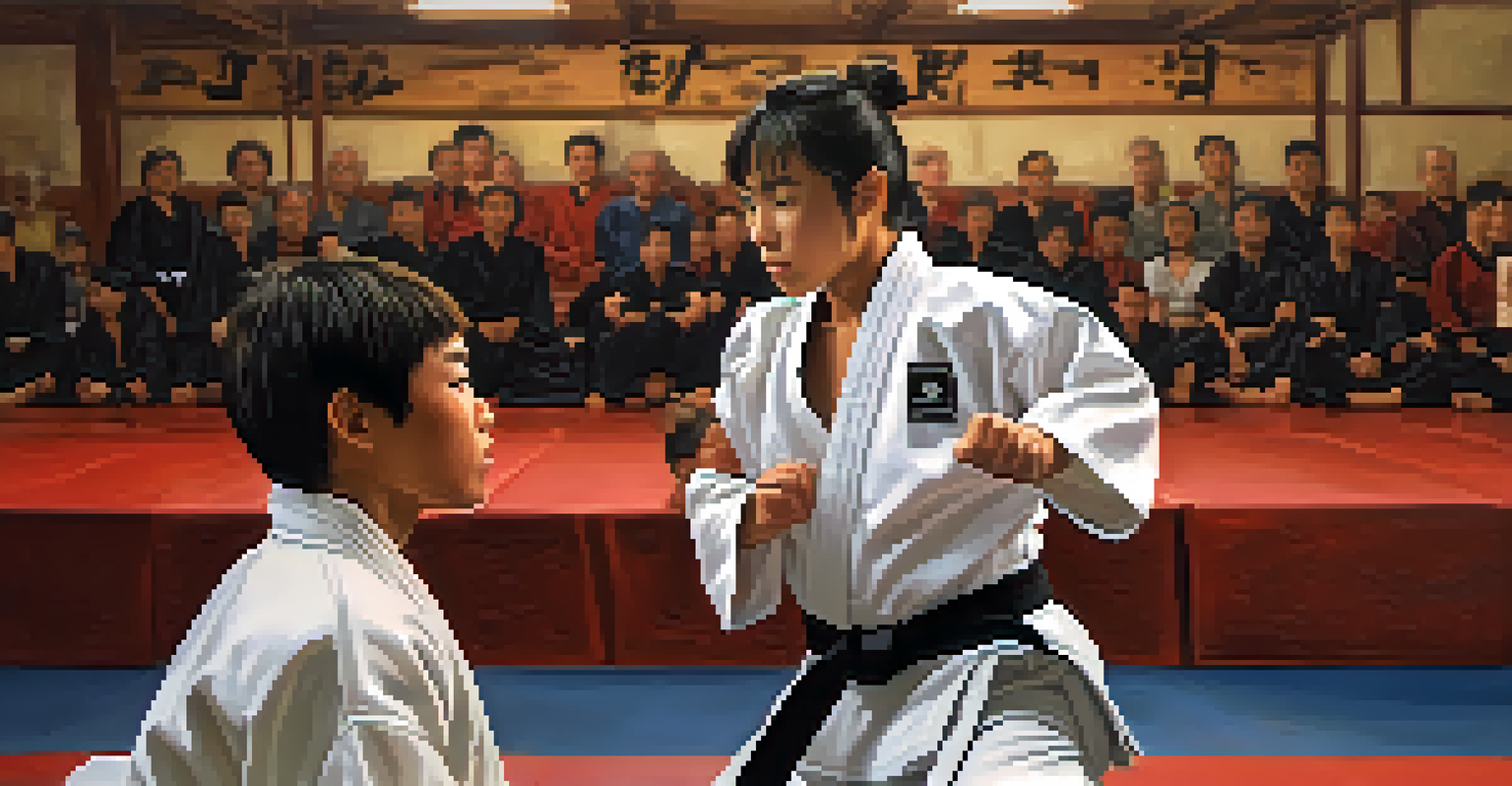Teamwork and Camaraderie: Lessons from Martial Arts Training

Understanding Teamwork in Martial Arts Training
Teamwork in martial arts goes beyond just practicing techniques together. It embodies the essence of collaboration, where each member contributes their strengths towards a common goal. Just like in any team sport, effective communication and trust play critical roles in building a cohesive unit.
Alone we can do so little; together we can do so much.
When training in pairs or larger groups, martial artists learn to rely on each other for feedback and support. For instance, a student might hold pads for their partner, allowing them to practice strikes while also fostering a sense of accountability. This interdependence creates a dynamic environment where everyone thrives together.
Ultimately, the camaraderie built during these sessions enhances the overall training experience. Practitioners not only develop their skills but also establish lasting friendships, transforming the dojo into a second home where teamwork flourishes.
The Role of Trust in Martial Arts Partnerships
Trust is a cornerstone of effective teamwork in martial arts. Practitioners must feel confident in their partners' abilities to ensure safety during sparring and drills. This mutual trust is cultivated over time through consistent practice and open communication.

For example, when a beginner trains with a more experienced partner, they learn to trust that their partner will guide them safely through techniques. This trust not only enhances learning but also builds a strong bond between partners, reinforcing the idea that they are in this journey together.
Teamwork Enhances Training Experience
Collaboration in martial arts fosters trust, communication, and lasting friendships among practitioners.
As trust deepens, so does the level of cooperation and support among team members. A trusting environment allows practitioners to push their limits, knowing that their teammates have their backs, which ultimately leads to personal growth and improved skills.
Building Resilience Through Shared Challenges
Martial arts training often involves facing challenges that require both mental and physical resilience. When students work together to overcome tough drills or sparring sessions, they develop a sense of camaraderie that strengthens their bonds. This shared struggle creates a unique connection among team members.
Teamwork is the ability to work together toward a common vision. The ability to direct individual accomplishments toward organizational objectives. It is the fuel that allows common people to attain uncommon results.
Consider a scenario where a group of students prepares for a big tournament. They train tirelessly, pushing each other to improve. The shared goal of competing together fosters a spirit of unity, motivating everyone to give their best effort and support one another.
Through these experiences, practitioners learn that resilience isn't just about individual strength; it’s also about leaning on each other during tough times. The lessons in teamwork learned on the mat translate to life, preparing them to tackle challenges outside of training.
Effective Communication: The Heart of Teamwork
In martial arts, effective communication is vital for a successful training experience. Practitioners must articulate their needs and feedback clearly, ensuring that everyone is on the same page. This open dialogue fosters a collaborative atmosphere where questions are welcomed and insights are shared.
For instance, during a sparring session, a partner might suggest adjustments to improve technique. This constructive feedback, when given and received positively, strengthens the learning process and builds respect among teammates. It’s all about creating an environment where everyone feels comfortable sharing their thoughts.
Resilience Built Through Challenges
Facing tough drills together strengthens bonds and cultivates resilience within the team.
Moreover, this emphasis on communication extends beyond the dojo. The skills learned in martial arts can enhance interpersonal communication in everyday life, whether in professional settings or personal relationships. Effective teamwork starts with clear communication, and martial arts training exemplifies this principle.
Diversity in Teamwork: Learning from Different Styles
One of the beautiful aspects of martial arts is its diversity. Practitioners come from various backgrounds and bring different styles to the table, enriching the training environment. This diversity fosters creativity and innovation in techniques, promoting a deeper understanding of martial arts as a whole.
When students collaborate with those who practice different styles, they gain new perspectives and techniques. For example, a karate practitioner might learn grappling techniques from a jiu-jitsu student, broadening their skill set and enhancing their overall martial arts journey.
Such interactions not only improve individual techniques but also promote respect and appreciation for the diversity within the martial arts community. Embracing different styles teaches practitioners that teamwork is about valuing each other's unique contributions to the collective goal.
Celebrating Achievements Together
In martial arts, celebrating achievements, big or small, is essential for fostering camaraderie. When students earn a new belt or master a difficult technique, the entire team shares in the joy of that accomplishment. This collective celebration reinforces the idea that success is a team effort.
For example, during belt promotions, it's common for practitioners to cheer for one another, creating an uplifting atmosphere. These celebrations not only motivate individuals but also strengthen the ties between team members, reminding them that they are part of a supportive community.
Life Skills from Martial Arts Training
The teamwork and communication skills learned in martial arts can be applied to various life situations.
Moreover, recognizing each other's achievements helps to build confidence and encourages everyone to strive for their personal best. The joy of shared success uplifts the entire team, fostering a sense of belonging and motivation to continue pushing forward together.
Lessons Beyond the Dojo: Applying Teamwork in Life
The lessons learned from martial arts training extend far beyond the dojo. The teamwork, trust, and resilience developed during training can be applied in various aspects of life, from the workplace to personal relationships. Practitioners often find themselves better equipped to handle challenges outside of martial arts.
For instance, someone who has trained in a team-oriented martial art may find it easier to collaborate with colleagues on projects, leveraging their experience in effective communication and mutual support. These skills foster a positive work environment and enhance productivity.

Ultimately, martial arts teaches that teamwork is an essential life skill. By embracing the principles of camaraderie learned on the mat, practitioners can navigate life's challenges with confidence, knowing they have the support of their community behind them.